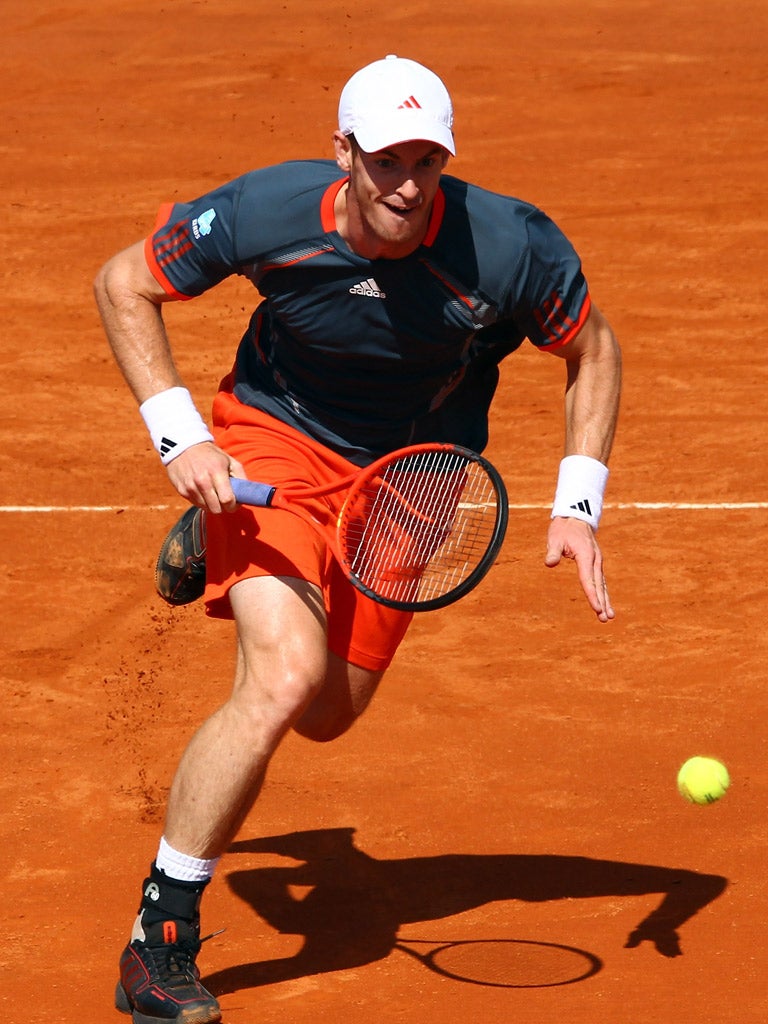
Your support helps us to tell the story
From reproductive rights to climate change to Big Tech, The Independent is on the ground when the story is developing. Whether it's investigating the financials of Elon Musk's pro-Trump PAC or producing our latest documentary, 'The A Word', which shines a light on the American women fighting for reproductive rights, we know how important it is to parse out the facts from the messaging.
At such a critical moment in US history, we need reporters on the ground. Your donation allows us to keep sending journalists to speak to both sides of the story.
The Independent is trusted by Americans across the entire political spectrum. And unlike many other quality news outlets, we choose not to lock Americans out of our reporting and analysis with paywalls. We believe quality journalism should be available to everyone, paid for by those who can afford it.
Your support makes all the difference.At this rate Andy Murray's rivals will want to go on court accompanied by a doctor. For the fourth time in his last five tournaments the 24-year-old Scot made progress thanks to the retirement or withdrawal of an opponent, after Julien Benneteau suffered elbow, ankle and wrist injuries yesterday in a heavy fall in their third-round encounter here at the Monte Carlo Masters.
Murray was serving at 5-5 in the first set when Benneteau turned his right ankle as he stretched to play a forehand. The 30-year-old Frenchman fell on his right arm and lay on the court, writhing in pain, until a trainer arrived. He resumed with his ankle strapped but could barely hold his racket and retired after taking another medical time-out.
Benneteau was told later that he had broken a bone in his elbow, which may keep him out of the French Open and will probably end his chances of competing at the Olympics, where he would have been a contender to play doubles.
Juan Monaco retired hurt after a similar fall earlier this week. Benneteau did not blame the court, but Murray said there had been a problem with it. "In parts it's not flat," Murray said. "Normally the courts here are fantastic. They said they had a few problems with it during the Davis Cup [earlier this month] but they changed it. Clay courts usually take a while if you make changes to them, before they've settled. That's probably why there were a few bad bounces and guys are struggling with their movement a little bit."
Murray, who lost his later doubles against the Bryan brothers in partnership with his own brother Jamie, had made a good start to lead 2-0, but Benneteau broke back immediately. Thereafter the set was tight as Benneteau kept him pegged back with a series of attacking strokes, mixed up with some well-executed drop shots.
Tomas Berdych, Murray's opponent in today's quarter-finals, has won three of their five meetings and beat him in straight sets at the French Open two years ago. Murray said the Czech was unlike most opponents in that he did not play with more top spin on clay, preferring to stick with his flatter ground strokes, hit with great force.
"He can play that way on most surfaces," Murray said. "He doesn't make major adjustments really for any of the courts. He has his way of playing. He's 6ft 5in tall, a really strong guy, and has a lot of power. A lot of guys tend to be more patient on clay because you can't just be going for outright winners, but that's what he does because that's his style and because he can. He's got so much power."
On a day punctuated by thunderstorms and frequent rain delays, an emotional Novak Djokovic completed a 6-2, 1-6, 6-4 victory over the Ukrainian Alexandr Dolgopolov. Djokovic learned in the morning that his grandfather had died and his mind seemed elsewhere for much of the match. Rafael Nadal kept up his quest to win the title for the eighth year in succession when he beat Kazakhstan's Mikhail Kukushkin 6-1, 6-1.
Join our commenting forum
Join thought-provoking conversations, follow other Independent readers and see their replies
Comments